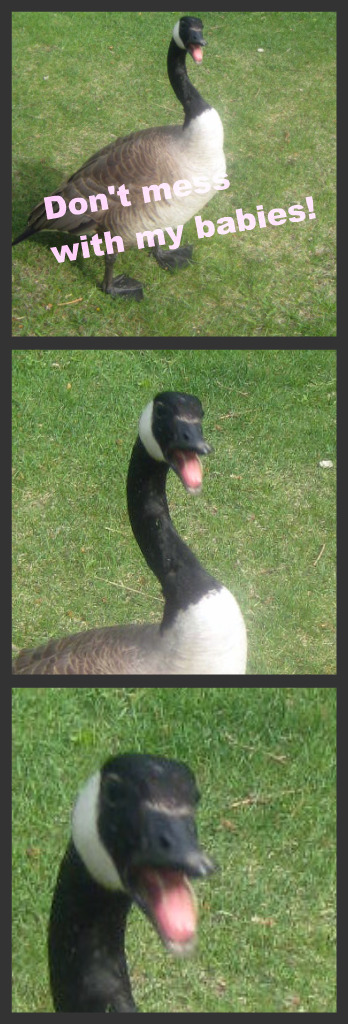Motherhood is wired into animals: A mother duck won’t let you near her babies.
This lesson reviewed for me powerfully as I was admiring the baby ducklings on my run in the Calgary Bow River Trail Park last weekend.
They were resplendent in their furriness…adorable, fuzzy little creatures. They were my second favorite thing to look at on my trip last weekend. I couldn’t stop gawking at these cute babies as they waddled in packs.

My most favorite thing was closely related to this: their mothers and their hostility towards me.
I am a heckuva lot bigger than they are. Really, a mother duck is no match for a human like me—even though I’m not particularly vertically gifted. I’m bigger, stronger, and smarter. Now, mother ducks have hard beaks, but really, I think I could take her…ordinarily.
But a mother duck has the zeal of a mother looking after her babies. And no human is a match for that.
The mother ducks hissed at me something fierce when I got too close to admiring their little ones. They’d hiss at me fiercely and hustle off their little ducklings. Hiss and hustle. Hiss and hustle. Took their jobs of keeping their offspring safe VERY seriously.

I LOVED that.
See, I firmly believe that little ones everywhere love living in the security of their mothers protecting and them and keeping them safe. Mothers everywhere are keeping their offspring safe…calves, lambs, ducklings and so on. One of the first things I remember learning when I went to a National Park for the first time is: “NEVER stand between a mother bear and her cub”.
Which is why some of my clients so desperately struggle with depression when they live with the devastating feeling that: “My mother didn’t protect me”. Often times, a person can be more upset at their mother for not keeping them safe than they are upset about the person who was dangerous for them:
- The pain of knowing a mother chose not to leave an abusive home. Mom may also have been yelled at, ridiculed and hit, or maybe she wasn’t–but was scared to consider options and put her hands over her ears when dad tore a strip one side and down the other off a kid.
- The abandonment that is felt when it seems a mom looked the other way when a relative touched them in a way that was “bad touch”. She might have wondered how the family would react–if they would believe her and the child…it was just easier to show up at the next family gathering and pray that it wouldn’t happen that time.
- The feeling of being unimportant when mom makes excuses for a father’s yelling and drunken rages and dismisses the terror of the children and expected them to not notice the broken furniture or holes in the walls the next morning. The child lives with an ongoing sustained level of fear that happens when there is the knowledge that it might happen again tomorrow, or maybe the next night, or maybe next week, but certainly knowing it will happen again. And sensing that if it gets worse, they’re in real trouble because mom doesn’t recognize the seriousness and won’t take action.
These children fear that which is unsafe (as all would) but also fear that their mother won’t protect them when the level of danger rises because they have learned that she doesn’t put their safety first. That is a double whammy for a kid.
I recognize that mothers who don’t protect their kids often didn’t experience protection themselves—having grown up in abusive homes or in residential schools, and themselves didn’t have models which demonstrated how to protect children, and provide them with that sense of safety. It’s hard to provide something that one has never experienced.
It’s natural to want to feel safe and protected. It’s natural to look to mom to expect her to protect you and keep you safe. We see it all around us. I have seen people cope with significant abuse with amazing resilience which is aided when they have parents that take action, that recognize that something to needs to happen to keep the child safe, when they are outraged at the source of danger, and offer help/support/hugs/security. And when it doesn’t happen, the sense of betrayal and confusion is huge. Children wonder, “What is wrong with me that she doesn’t protect me?” or “How come she doesn’t love me enough to keep me safe?” Children (of all ages) scramble for missing pieces of the puzzle as they endeavor to understand that betrayal.
Having worked with many who struggle with the sense of loss of a mother’s protection, it warmed my heart to see one mommy duck after another quickly gather her courage and without thinking, let me know that there is no messing with her babies.
Thanx, mother ducks…you done my heart good.






Write a Comment